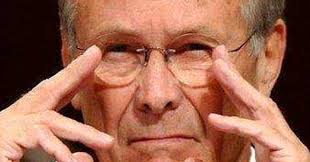
There are known knowns; there are things we know we know. We also know there are known unknowns; that is to say we know there are some things we do not know. But there are also unknown unknowns — the ones we don’t know we don’t know. Donald Rumsfold
Lots of people had fun at Donald Rumsfold’s expense when he made this pronouncement. As time passed, people reflected on it and thought perhaps there was more to it that initially met the eye.
It seems to me that revealing our clients’ ‘Unknown Unknowns’ is exactly what experienced service providers can do and it sets them apart from inexperienced businesses.
Furthermore, anticipating our own unknown unknowns can help us navigate our professional waters a little more skilfully.
What do I mean by this and how can we do it?
Well, let’s begin by going back a little.
The Known Knowns
There are clients who do know exactly what they want. Well, this is a great starting point. A graphic, designer, for example, will be able to make much faster progress if the client already has a clear idea about the brand image they want to project.
Having said that, there will be times when, informed by our experience and judgement, we need to steer the client into a different direction. Recently somebody approached me to perform magic at their wedding, explaining they needed somebody for eight hours. Well, I knew that they were massively over-estimating how long the booking would need to be and was able to direct them to a much more realistic -and cheaper! – timeframe.
The Known Unknowns
Some clients may come to us with only a very vague notion of what they want. They know that there is something they need…and they also know that they don’t know how to obtain it.
For example, somebody might know they want to reduce their tax burden but have no idea how to achieve this. They decide to approach an accountant.
Finally, the
Unknown Unknowns
I think of these as being those situations when there are things the client doesn’t know that they don’t know…but we do.
In other words, we apply our foresight to anticipate problems and issues and suggest solutions to them.
Let’s take, for example, a wedding planner. The couple will probably come with ‘known knowns’ (eg the where and when; the type of attire; the evening entertainment). They may have some ‘known unknowns’ (eg Do they need Banns if they are having a civil marriage?). Then there are the things they haven’t even thought about: the unknown unknowns.
These are the issues they don’t realize are issues.
The wedding planner might draw their attention to potential problems such as:
- Lots of people milling around with nothing to do while the couple are having their wedding photos taken.
- An unexpected delay in the meal service.
- People who don’t know each other trying to make conversation over dinner.
- Children becoming restless during the speeches.
- The lull in activities if there is a gap between the meal and the dancing.
- The need to provide for people in the evening who, perhaps, can’t dance and might not enjoy the music
Now, there are several types of entertainment that can help alleviate the problems: balloon modellers, magicians, caricaturists, poker tables, photo booths are all examples of solutions.
Re-framing
The thing is, the couple may have only ever thought of these as additional, expensive and not very necessary, extras. The attitude may be, “Oh, we don’t really need a magician.”
What the planner can explain is that these entertainers provide a solution to potential weak points on the big day. They can re-frame things so that the couple see them in a new light.
I have used wedding planners as my example but of course the point is valid for people working across a whole range of occupations.
Anticipating Unknown Unknowns
How can we anticipate the Unknown Unknowns for our clients and ourselves?
I have two methods.
Using Notebooks and Checklists
I have notebooks where I keep brief notes about each performance I give, (eg which material I used during a show so I can use different material at a re-booking). At the back of this book is a page where I list anything I learn for the future.
These form the basis of the unknown unknowns for potential clients (as in the wedding example above) and my own unknown unknowns.
For example, on my way to a booking in Wales a couple of weeks ago, I nearly ran out of petrol. This raised my anxiety levels and distracted me when I really should have been preparing myself mentally. I decided that must never happen again. I made a note to add to my Getting Ready for a Gig checklist to always fill the tank before leaving Manchester.
What If?
The other strategy I use to reveal Unknown Unknowns is one I learned when I was a teacher, planning lessons. I would repeatedly ask myself the simple question: what if?
What if the photocopies didn’t arrive from reprographics in time? What if some of the pupils ‘didn’t get’ the work? What if some pupils finished an activity very quickly? What if somebody had missed the previous, foundation lesson?
By anticipating these circumstances I improved my chances of dealing with them smoothly should they arise.
Of course, it’s in the very nature of unknown unknowns that we can never be sure if there is something about to give us -or our clients- an unwelcome shock.
What we can do is be aware that it is the way of the world that something is waiting to thwart us! By learning from our experience and using our imagination to anticipate difficulties, we can at least reduce the number of unknown unknowns for everybody.

